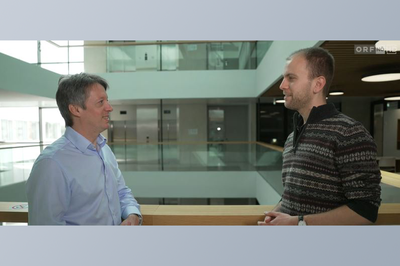IT Security
Bachelor programme
More courses from the department
Computer Science & SecurityDemand for Security Experts Stronger than ever Before
Targeted cyber attacks on companies are perpetrated almost daily, which means that cybercrime poses one of the world's major threats to the economy nowadays. At the same time, our dependency increases since most processes are computer-aided and in the time of the Internet of Things, a great number of devices are already connected to the Internet. Become an expert in the field of IT Security to address these challenges.

Information, Links and Downloads
News

Focus on AI and IT Security
A Report on the IT Security Community Exchange (IT-SECX) at the St. Pölten UAS

FH goes Machine Learning Prague 2024
Data Intelligence research group back at this year's ML Prague

St. Pölten UAS on ORF
Alexander Adrowitzer in an interview on Niederösterreich heute
FAQ
Which contents are taught in this bachelor degree programme?
You receive fundamental training in all major focus areas of IT security:
- Secure Infrastructure & Networking:
You acquire skills in network protocols, routing, and switching. On this basis, the most important hardware components and protocol specifications are covered to enable you to securely plan and operate networks. - Operating Systems & Cloud Security:
You learn to administer Windows and Linux systems and identify and mitigate security risks. - Secure Software & Ethical Hacking:
You acquire skills in applied programming and data bases in all stages of the software development lifecycle. The security aspect is always at the centre and includes penetration testing of codes and applications. - Security Management:
You learn about security norms and standards for companies and familiarise yourself with risk and emergency management and the legal basics pertaining to contract law and data protection.
Will this study programme make a hacker of me?
To secure IT systems and data the best possible way, it is necessary to learn about the strategies and methods of attackers. In this sense, you, indeed, learn how hackers work and become, yourself, an ethical hacker who always puts the human good and the security of the organisation you obliged to protect first and helps to close identified weak spots.
What are my career chances as a graduate of this study programme?
As a graduate of the bachelor degree programme IT security you are highly sought after in every field that requires secure IT operations or wherever a secure IT product needs to be developed. Once you have the necessary professional experience, you can also work in middle or upper management.
Typical activities for graduates are:
- Security Officer (Chief Security Officer / (Chief) Information Security Officer)
- Security Architect
- Secure Software Developer
- IT Forensics Expert
- Security Cloud Specialist
- Security Consultant
- Network/Operating Systems Administrator
- Data Protection Officer
- Auditor
- Information Security Manager
- Disaster Recovery and Business Continuity Analyst or Manager
- System, Application, Network / Web Penetration Tester
- Incident Responder
How important is practical orientation in this study programme?
Practical orientation is a major component of this study programme. In several projects and formats such as the crisis week, you prepare yourself both theoretically and practically for a plethora of real-life scenarios.
In our Cyber Defense Centre (CDC), you acquire important competences in detecting and analysing harmful activities in networks and operating system. You also benefit from close ties to experts from the practical realm – be it in the context of guest lectures or during free conference visits.
What does blocked teaching mean?
Blocked teaching means that individual modules of a semester are taught as a block and within a few weeks. This form of teaching differs from the “classic” teaching system when several courses are taught equally distributed throughout the entire semester.
In the block system, you can concentrate on just one assignment or topic during each course: teaching and the final exam (first attempt) for a module are completed before the next block starts. The workload is therefore more equally distributed and it is easier to remember the course content until the exam takes place.